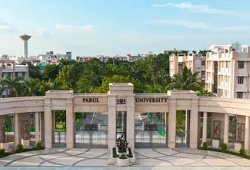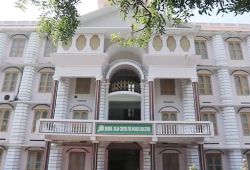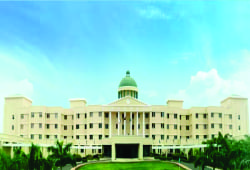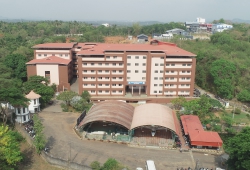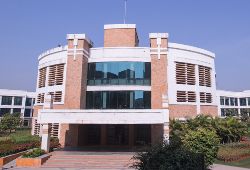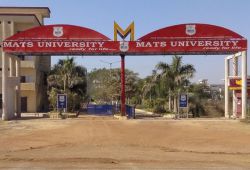Bangalore is a view of beauty and also the capital of Karnataka Indian state. Bangalore is also known as “Silicon Valley of India” because it has headquarters of engineering organizations such as HAL, ISRO, etc. Bangalore is well known for the cultural, ethical values and education standards. The aviation sector is touching sky so Aerospace Engineering became well-known course. There are many best Aerospace Engineering Institute in Bangalore.
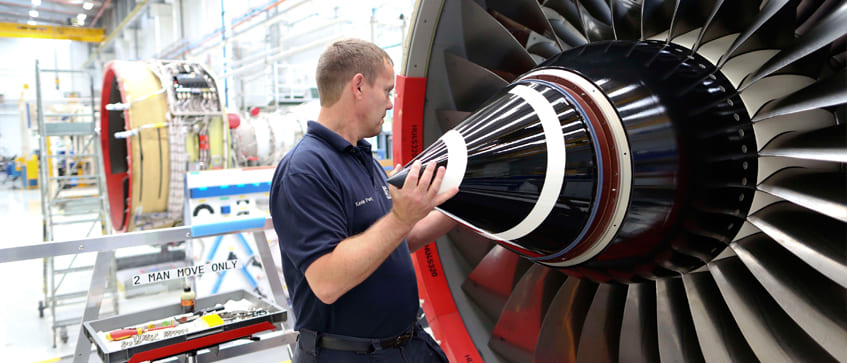
Best Aeronautical Engineering Colleges in Bangalore
Aspiring engineers have always been drawn to the field of aeronautical engineering. Designing, creating, and maintaining spacecraft and aircrafts is a rewarding and challenging opportunity. The first and most important step in pursuing a career in aeronautical engineering is picking the right college. You have a number of excellent options in Bangalore, a city renowned for its educational institutions and booming aerospace industry. The top aeronautical engineering colleges in Bangalore will be examined in this article.
Aeronautical Engineering Course Fees in Bangalore
The cost of studying aeronautical engineering must be taken into account, even though educational quality is of utmost importance. To assist you in making an informed choice, we will dissect the costs related to Bangalore's aeronautical engineering programs. For prospective aviation enthusiasts, selecting the best college to pursue a degree in aeronautical engineering is essential. Numerous colleges in Bangalore, a city renowned for its growing aerospace sector and esteemed educational establishments, provide programs in aeronautical engineering. We have created a table that lists the average, minimum, and maximum costs for Bangalore's aeronautical engineering colleges in order to assist students in making an informed choice.
Table: Aeronautical Engineering Colleges Fees in Bangalore
|
College Name |
Average Annual Fees (INR) |
Minimum Annual Fees (INR) |
Maximum Annual Fees (INR) |
|
Indian Institute of Science (IISc) |
1,00,000 |
50,000 |
1,50,000 |
|
Indian Institute of Technology (IIT) Bangalore |
2,50,000 |
1,50,000 |
3,50,000 |
|
Ramaiah Institute of Technology (MSRIT) |
75,000 |
45,000 |
1,00,000 |
|
BMS College of Engineering |
80,000 |
60,000 |
1,20,000 |
|
PES University |
1,20,000 |
80,000 |
1,80,000 |
|
Amrita School of Engineering |
1,40,000 |
1,00,000 |
2,00,000 |
|
Hindustan Aviation Academy |
1,30,000 |
90,000 |
1,60,000 |
|
Dayananda Sagar College of Engineering |
1,00,000 |
60,000 |
1,20,000 |
Note: The above figures are approximate and subject to change. The fees mentioned in the table are for the 2023-2024 academic year.
Aeronautical Engineering Campus Facilities in Bangalore
For practical training and research opportunities, aeronautical engineering requires specialized infrastructure and facilities. We'll examine the campus amenities provided by these Bangalore colleges in more detail. In order to give students a practical, real-world learning experience, the field of aeronautical engineering requires both top-notch instruction and cutting-edge facilities. Modern campus facilities are available at a number of aeronautical engineering colleges in Bangalore, which is regarded as the center of the Indian aerospace industry. This article examines the wide range of resources offered by these establishments so that students can make well-informed choices regarding their academic paths.
- Modern Laboratories: The laboratories are the center of any program in aeronautical engineering. The cutting-edge labs at Bangalore's aeronautical colleges enable students to carry out research, design projects, and experiments. These labs give students a hands-on understanding of aviation technology and include wind tunnels, facilities for testing composite materials, and flight simulation labs.
- Aircraft Maintenance Hangars: Bangalore is home to numerous aeronautical colleges with aircraft maintenance hangars on campus. These facilities give students the chance to work on real aircraft, giving them practical experience in aircraft inspection, maintenance, and repair. For those who want to work in the aviation sector, this exposure is priceless.
- Library Resources: The library is a wealth of information for students studying aeronautical engineering. A wide range of books, research papers, and journals pertaining to aeronautics and aerospace engineering are available in the libraries of Bangalore's colleges. Students' research skills are also improved by having access to online databases and e-resources.
- Aviation Workshops: Workshops are essential for comprehending the complexities of aviation technology. Students can construct, fix, and alter aircraft parts with the help of the tools and equipment in these workshops. They are a haven for creativity and experiential education.
- Computer Labs: Computer labs are crucial for students studying aeronautical engineering in the current digital era. Specialized software for structural analysis, design, and aerodynamic simulations is available in these labs. They help students improve their computational abilities and work on challenging engineering projects.
- Classrooms and Lecture Halls: The aeronautical colleges in Bangalore have classrooms that are set up to encourage interactive learning. They frequently have audio-visual equipment, which helps with effective lecture delivery. To create a favorable learning environment, lecture halls are roomy and furnished with contemporary teaching aids.
- Research Centers: Advanced aerospace research is the focus of specialized research centers established by Bangalore's aeronautical engineering colleges. These facilities give faculty and students the tools and space they need to work on creative research projects.
- Hostel and Accommodation Facilities: Given the diverse student body, many universities provide on-campus housing options. These facilities offer a cozy living space that helps students feel connected to one another. These accommodations prioritize safety and security.
- Sports and Recreational Facilities: Academics are only one aspect of a holistic education; mental and physical health are also important. In order to guarantee a balanced lifestyle, Bangalore's aeronautical engineering colleges offer a range of sports and sports and recreation facilities, such as sports fields, gyms, and cultural clubs.
Eligibility Criteria for Aeronautical Engineering Colleges in Bangalore
Eligibility criteria for admission to aeronautical engineering colleges in Bangalore typically include:
- Academic Qualifications: Having a solid background in mathematics, physics, and chemistry and passing the 10+2 exam.
- Entrance Examinations: Passing state-level engineering entrance exams or entrance exams such as JEE Main, JEE Advanced, or AME CET.
- Minimum Aggregate Marks: Minimum aggregate marks (usually 50% or higher) in the qualifying examination.
- Additional Entrance Exams: Candidates may need to pass extra entrance exams administered by the individual colleges in order to be admitted to some of them.
- Age and Nationality: In order to be eligible, applicants may need to meet certain nationality or age restrictions set by particular colleges.
Aeronautical Engineering Colleges Admission Process in Bangalore:
The following steps are involved in the AME CET admissions process for Bangalore's aeronautical engineering colleges:
- Application: The first step for prospective students is to complete the AME CET application form and supply the necessary information.
- Entrance Exam: The AME CET exam, which assesses candidates' knowledge and proficiency in aircraft maintenance engineering, must be taken.
- Counseling: Following the announcement of the exam results, qualified applicants are asked to attend counseling sessions where they can select the colleges and courses that best suit their needs based on their AME CET scores and available seats.
- Document Verification: Candidates must present the required paperwork during the counseling process, such as their identification documents, AME CET scorecards, and educational certificates.
- Seat Allotment: Candidates are given seats by colleges according to their selections and performance on the AME CET Exam.
- Fee Payment: To guarantee their spot at the selected college, admitted students must pay the necessary fees.
- Reporting to College: Lastly, in order to finish the admissions requirements and start their aeronautical engineering program, students who were accepted through AME CET must report to their respective colleges on the specified date.
Aeronautical Engineering Entrance Exam in India:
Standardized tests known as entrance exams for aeronautical engineering are used to evaluate the skill, knowledge, and abilities of prospective students hoping to work in the field. For many colleges and universities that offer aeronautical engineering programs, these tests are an essential component of the admissions process. For admission to aeronautical engineering programs in India, a number of well-known entrance exams are accepted, including:
- Joint Entrance Examination (JEE) Main: The national entrance exam known as JEE Main evaluates applicants' knowledge of mathematics, physics, and chemistry. For admission, JEE Main scores are taken into account by a number of prominent engineering colleges in India, including those in Bangalore.
- Joint Entrance Examination (JEE) Advanced: After passing JEE Main, candidates move on to JEE Advanced. Admission to the esteemed Indian Institutes of Technology (IITs), some of which provide programs in aeronautical engineering, is determined by this.
- Aircraft Maintenance Engineering Common Entrance Test (AME CET): Colleges in Bangalore and throughout India that offer programs in aircraft maintenance engineering, a field closely related to aeronautical engineering, accept the AME CET, which was created especially for admission to such programs.
- State-Level Engineering Entrance Exams: Students can use the results of the engineering entrance exams administered by several Indian states to gain admission to aeronautical engineering programs in those states.
Download Brochure for Aeronautical Engineering Colleges in Bangalore:
Open the door to your skyward journey. Take the first step towards your exciting aerospace career by downloading the brochure, which provides a thorough overview of Bangalore's Aeronautical Engineering Colleges.
Specializations in Aeronautical Engineering:
Due to its multidisciplinary nature and range of specializations, aeronautical engineering enables students to customize their education to fit particular interests within the aerospace sector. Bangalore's aeronautical engineering colleges provide a variety of specialized programs to meet the various needs of the aerospace and aviation industries. Here, we examine a few of the main specializations that these colleges require to their students:
- Aircraft Design and Manufacturing: Aerodynamics, structural design, materials, and manufacturing processes are all covered in this specialization, which is centered on the development of aircraft. Students become proficient in creating safe and effective aircraft designs.
- Aerospace Propulsion: Propulsion systems, rockets, and aircraft engines are all part of aerospace propulsion. Students gain knowledge of engine design, flight mechanics, and propulsion principles.
- Avionics and Control Systems: The electronic systems on aircrafts, such as flight control, navigation, and communication, are the focus of avionics. This area of expertise explores the technology that maintains the efficiency and safety of aircrafts.
- Aircraft Maintenance and Repair: The maintenance, inspection, and repair of aircraft are the main areas of expertise for this specialization. Students gain expertise in guaranteeing the safety and airworthiness of aircraft, which makes them beneficial in the aviation sector.
- Space Technology and Exploration: This specialization explores spacecraft design, satellite technology, and space mission planning in response to the growing interest in space exploration. Projects involving satellites, space missions, and interplanetary exploration may be undertaken by students.
- Aeronautical Research and Development: This specialization focuses on advanced aeronautics research for those who are interested in research. Students work on projects that challenge the limits of aerospace innovation and technology.
- Unmanned Aerial Vehicles (UAVs) and Drones: This specialization focuses on the development, use, and deployment of unmanned aerial vehicles (UAVs) for tasks like data collection, delivery, and surveillance, given the growing prevalence of UAVs and drones in a variety of industries.
- Aerospace Management: Students interested in the business side of the aviation industry are the target audience for aerospace management. Topics including airline management, aviation marketing, and aviation operations are covered in this specialization.
Higher Qualifications in Aeronautical Engineering:
Professionals wishing to progress their careers, focus on particular areas, or conduct cutting-edge research may find that obtaining additional credentials can lead to a lot of opportunities of in the dynamic and constantly changing field of aeronautical engineering. Aeronautical engineers may want to take into consideration the following additional qualifications:
- Master's in Aeronautical Engineering (M. Tech/MS): Professionals can specialize in areas such as structural design, propulsion systems, or aerodynamics with a postgraduate degree in aeronautical engineering. It's a great option for people who want to work in research or in more technical roles.
- Doctor of Philosophy (Ph.D.) in Aeronautical Engineering: A Ph.D. in aeronautical engineering provides the opportunity to significantly advance the field for individuals who are passionate about research and innovation. Careers in academia, research, or senior roles in the aerospace sector may be available to those with this qualification.
- Master of Business Administration (MBA): In the aerospace sector, combining an MBA with a technical background can lead to management and leadership positions. Business-savvy aeronautical engineers are extremely useful for managing aerospace projects and making strategic choices.
- Certifications and Licenses: Becoming a licensed aircraft maintenance engineer (AME) or earning certifications in particular software or technologies utilized in the aerospace industry are just a couple of the certifications and licenses that aeronautical engineers can pursue.
- Short-Term Courses and Workshops: Attending short-term courses, workshops, and seminars provided by academic institutions and industry associations can help aeronautical engineers stay current on the most recent developments in the field.
- Specialized Master's Programs: A well-rounded education with a specific focus is provided by certain universities' specialized master's programs in fields like space technology, aviation safety, or aerospace management.
- Online Courses and Massive Open Online Courses (MOOCs): Numerous online courses and MOOCs covering a wide range of aerospace-related topics are offered on platforms such as Coursera, edX, and Udemy. These can be an adaptable and affordable way to learn new things.
Top Recruiters for Aeronautical Engineering Graduates:
Knowing the top recruiters can give you insights into your future job prospects. We'll highlight the companies that actively hire aeronautical engineering graduates from Bangalore.
Aeronautical engineering graduates in India are in high demand across a variety of industries, given their expertise in aerospace technology and aviation. Here are some of the top recruiters that eagerly hire aeronautical engineering graduates:
- Indian Space Research Organization (ISRO): ISRO offers exciting career opportunities in satellite development, rocket propulsion, and space exploration projects.
- Hindustan Aeronautics Limited (HAL): HAL, a major aerospace and defense company, recruits aeronautical engineers for roles in aircraft and helicopter manufacturing.
- Defense Research and Development Organization (DRDO): Aeronautical engineers at DRDO work on defense technology projects, including missile development and avionics systems.
- Bharat Heavy Electricals Limited (BHEL): BHEL hires aeronautical engineers to work on gas turbine equipment used in power generation.
- National Aeronautics Laboratory (NAL): NAL focuses on aerospace research, and aeronautical engineers contribute to aircraft design, wind tunnel testing, and aerodynamic research.
- Air India: The national carrier employs aeronautical engineers for aircraft maintenance and engineering, ensuring flight safety.
- Private Aerospace Companies: Companies like Tata Advanced Systems, L&T, and Mahindra Aerospace provide diverse career opportunities in aerospace technology and manufacturing.
- Aviation Companies: airlines such as indigo, spicejet, and Vistara hire aeronautical engineers for aircraft maintenance and safety roles.
- Research and Development Centers: Aeronautical engineering graduates can engage in cutting-edge research in educational institutions, research centers, and independent organizations.
- Consulting and Engineering Firms: Consulting giants like Wipro, TCS, and Infosys have aerospace divisions that offer engineering solutions to the aviation and aerospace industry.
Aeronautical Engineering Course Syllabus
Understanding the syllabus is crucial for prospective students. We'll provide an overview of the typical curriculum and subjects covered in aeronautical engineering programs in india. Aeronautical engineering is an intricate and dynamic field that focuses on the design, development, and maintenance of aircraft and spacecraft. In the city of Bangalore, a major hub of the Indian aerospace industry, several prestigious colleges offer aeronautical engineering programs. This article delves into the syllabus of aeronautical engineering colleges in Bangalore, providing aspiring students with an overview of what they can anticipate during their academic journey.
First Year Courses:
- Mathematics and Applied Mathematics:
- Calculus
- Linear Algebra
- Differential Equations
- Probability and Statistics
- Physics:
- Mechanics
- Electromagnetism
- Waves and Optics
- Engineering Mechanics:
- Statics and Dynamics
- Kinematics and Kinetics
- Equilibrium of Structures
- Engineering Graphics:
- Geometrical drawing
- Projections
- Sectional views
Second Year Courses:
- Aerodynamics:
- Fundamental principles
- Compressible and incompressible flows
- Boundary layers
- Fluid Mechanics:
- Fluid properties and behavior
- Fluid statics and dynamics
- Control volume analysis
- Materials Science and Engineering:
- Properties of materials
- Material selection for aerospace applications
- Heat treatment and material testing
- Thermodynamics:
- Basic concepts
- Laws of thermodynamics
- Gas dynamics
Third Year Courses:
- Aircraft Structures:
- Structural analysis
- Stress and strain analysis
- Finite element analysis
- Aircraft Propulsion:
- Gas turbine engines
- Jet propulsion
- Propeller theory
- Aircraft Design and Manufacturing:
- Design process
- Manufacturing techniques
- Composite materials in aircraft design
- Avionics and Control Systems:
- Avionics components and systems
- Aircraft control systems
- Flight control systems
Fourth Year Courses:
- Flight Mechanics and Aircraft Performance:
- Aircraft performance parameters
- Stability and control
- Flight testing
- Aircraft Maintenance and Repair:
- Maintenance practices
- Aircraft inspection and repair
- Regulatory compliance
- Aerospace Propulsion Systems:
- Advanced propulsion systems
- Rocket propulsion
- Hybrid propulsion
- Project Work and Internships:
- Final year project
- Industry internships
Aeronautical Engineering Course Duration in India
For a Bachelor's degree program, the course length at aeronautical engineering colleges normally lasts four years, or eight semesters. Students study a wide range of topics during this time, including materials science, propulsion systems, aerodynamics, basic engineering principles, and aircraft design, among other specialized topics. In order to succeed in the dynamic and cutting-edge aerospace industry, where they can contribute to the design, development, and maintenance of aircraft and spacecraft, prospective aeronautical engineers must complete this four-year educational program.
Why to Choose Aeronautical Engineering Colleges in Bangalore?
How to Choose Top Aeronautical Engineering Colleges in Bangalore?
To choose one of the top Aeronautical Engineering Colleges in Bangalore can be through AME CET 2025 as it offers admission in one of the premier Aeronautical Engineering Colleges in Bangalore . All the Aeronautical Engineering colleges Bangalore are approved by AICTE, Govt. of India. The admission process to opt Aeronautical Engineering colleges in Bangalore through AME CET is as follows: -
- Candidate visits the official website of AME CET 2025 www.amecet.in and fills the AME CET application form from there.
- After qualifying exam, the candidate can take admission through AME CET 2025 counseling in one of the top Aeronautical Engineering Colleges in Bangalore .
List of Aeronautical Engineering Colleges in India

Puran Murti Campus, Delhi/NCR
Course:- Aeronautical Engineering
Duration:- 4 Year
Exam Required:- AME CET 2025
Read More Apply Now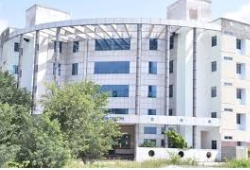
Adhiyamaan College of Engineering, Tamil Nadu
Course:- Aeronautical Engineering
Duration:- 4 Year
Exam Required:- AME CET 2025
Read More Apply Now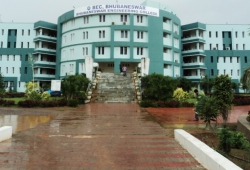
Bhubaneswar Engineering College, Odisha
Course:- Aeronautical Engineering
Duration:- 4 Year
Exam Required:- AME CET 2025
Read More Apply Now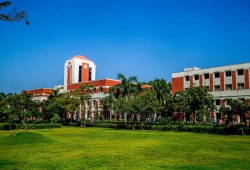
KCG College of Technology,Chennai, Tamil Nadu
Course:- Aeronautical Engineering
Duration:- 4 Year
Exam Required:- AME CET 2025
Read More Apply Now

